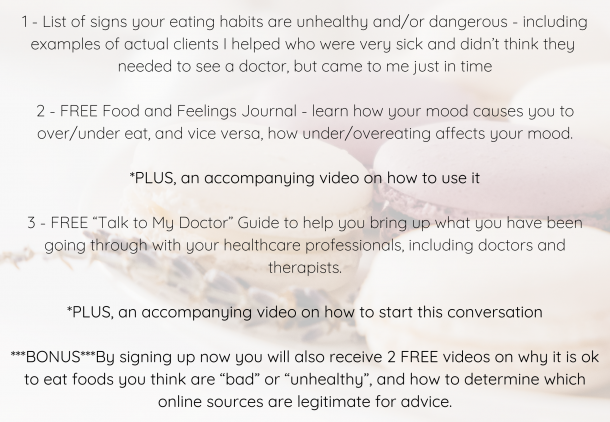By: Lauren MacLeod
Lauren is finishing up her dietetic internship at Cal Poly San Luis Obispo to become a registered dietitian. She hopes to work in outpatient counseling and has enjoyed working with the eating disorder population.
There’s been a lot of buzz around “body positivity” lately; it’s been adopted by social media influencers proudly displaying their “rolls,” while brands create advertisements using “real women”. In this blog post, I want to define some terms that have been receiving a lot of attention lately and dive into their origin stories. When society uses these terms, do we really understand the weight (no pun intended) of their meanings? Read on to see how much you know:

Body Positivity/Body Acceptance – Comes from The Body Positive, which was founded in 1996 as an alternative treatment for anorexia nervosa; it shifts focus away from changing body weight. The core competency of body positive movement is:
“uncover the messages that have influenced your relationships with your body, food, and exercise and develop a weight-neutral, health-centered approach to self-care to become the authority of your own body by sorting out facts from distorted societal myths about health, weight, and identity.”
In summary, body positivity is about accepting your body as it is and encouraging lifestyle choices that focus on health, not weight.
Fat Acceptance – A political movement focusing on equal rights and medical treatment of fat* people. The National Association to Advance Fat Acceptance (NAAFA) was established in 1969, when fat people realized they were being discriminated against in the workplace and medical settings based on body size. NAAFA gives them access to education and support for self-empowerment.
*“Fat” is a word that is being reclaimed, as “queer” has been reclaimed by the LGBTQ+ movement. It is meant to be empowering, not demoralizing.
Health at Every Size – Health is not determined by weight, but rather by healthy lifestyle changes: eating all foods in balance (intuitive eating), and mindful and enjoyable movement. It focuses on taking care of your body at whatever size it is, and looking for actual markers of health, such as blood pressure, rather than a number on the scale. It was established by Linda Bacon, PhD in her book Health at Every Size: The Surprising Truth About Your Weight. She has since written another book to combat the modern fight against diet culture: Body Respect.
Intuitive Eating: A term championed by Evelyn Tribole and Elyse Resch (CEDRDs) in 1995 through their book Intuitive Eating. It is composed of 10 principles that focus on rejecting diet culture, listening to what our bodies truly want and need, and repairing our broken relationships with food. It is not a diet, but rather the way humans naturally eat when listening to their body.
Diet Culture: I think the Eating Disorder Registered Dietitians and Professionals really hit the nail on the head with their definition: “…a belief system that focuses on and values weight, shape, and size over well-being. Variations of diet culture also include rigid eating patterns that on the surface are in the name of health, but in reality are about weight shape or size.”
Eating Disorder vs Disordered Eating: An eating disorder fits the diagnostic criteria as defined by DSM (Diagnostic and Statistical Manual of Mental Disorders). Disordered eating classifies irregular eating behaviors that do not neatly fit in to an existing diagnosis, but may still pose health risks, physical and/or psychological.
No matter which definitions you identify with, I hope to help you find a way to love yourself. Even if you cannot accept the body you’re in now, can you appreciate all the work that it does for you? Maybe you can even work towards loving it tomorrow.


